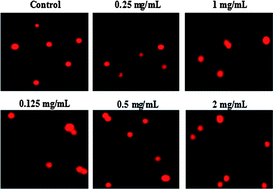Chronic inflammation has been linked to a wide range of progressive diseases, including cancer, neurological disease, metabolic disorder, and cardiovascular disease. Epidemiological studies have provided convincing evidence that natural dietary compounds, which humans consume as food, possess many biological activities, including chemopreventative activities against various chronic inflammatory diseases. Here, we investigated the effect of 50% ethanol extracts of pigeon pea, as well as its major component, cyanidin-3-monoglucoside, an anthocyanin, on DNA damage, the activity of antioxidant enzymes, and free radical scavenging capacity in hydrogen peroxide (H2O2)-treated RAW264.7 macrophages. High-pressure liquid chromatography results indicated that 2 mg of the 50% ethanol extracts of pigeon pea contained 45 μg of cyanidin-3-monoglucoside. A comet assay indicated that 50% ethanol extracts of pigeon pea (2 mg mL−1) and of cyanidin-3-monoglucoside (10 μM) protected RAW264.7 cells from DNA damage induced by a 24 h H2O2 treatment. These results can be attributed to the prevention of reduction in antioxidant enzyme activity and lipid peroxidation in H2O2-treated murine RAW264.7 macrophages by the 50% ethanol extracts of pigeon pea. Moreover, as there is an active interplay between oxidative stress and inflammation, we also evaluated the anti-inflammatory activity of the 50% ethanol extracts of pigeon pea and cyanidin-3-monoglucoside in lipopolysaccharide-treated RAW264.7 macrophages. We found that the 50% ethanol extracts of pigeon pea and of cyanidin-3-monoglucoside suppressed the production of inflammatory cytokines, including TNF-α, IL-1β, and IL-6, in these macrophages. These results imply that pigeon pea could be developed as a functional food by the food industry, or could be utilized for the commercial production of anthocyanins as antioxidants.


 Please wait while we load your content...
Please wait while we load your content...